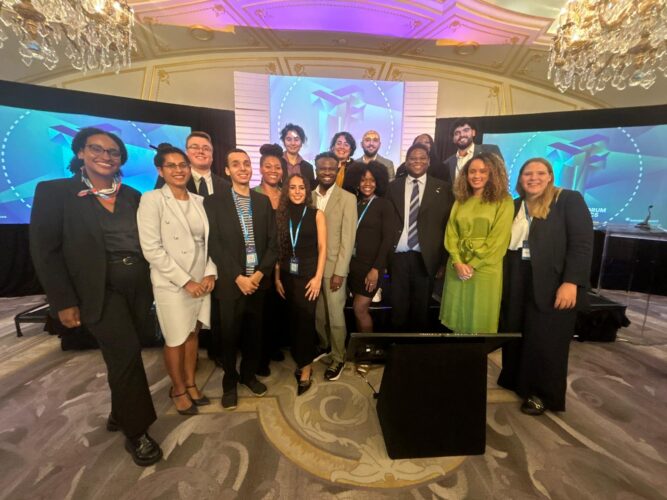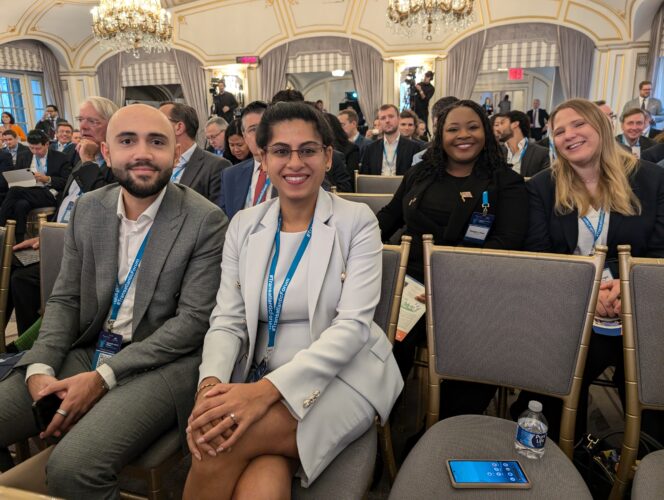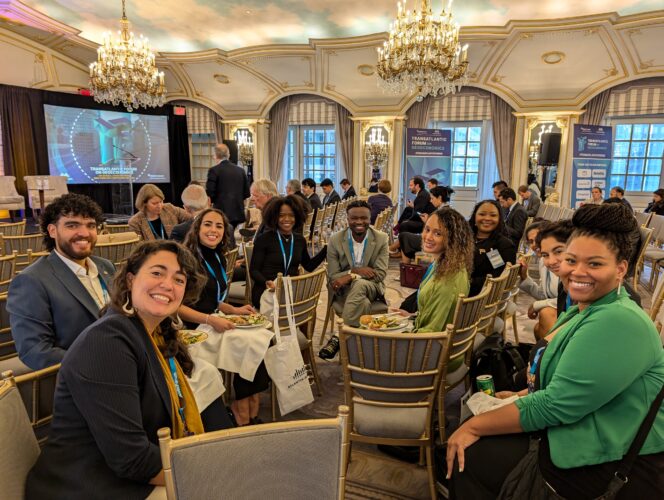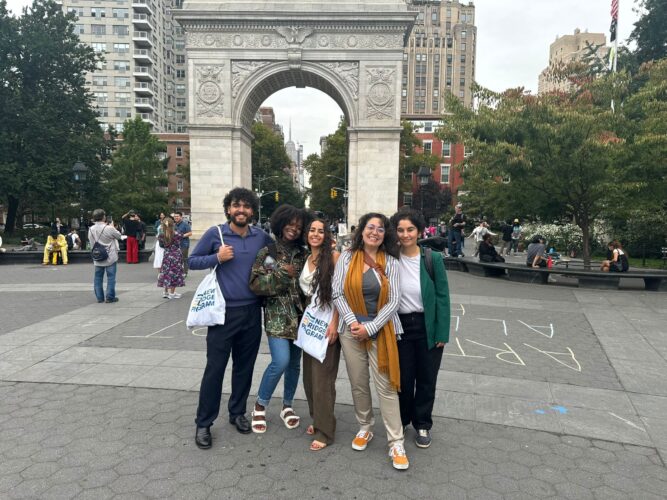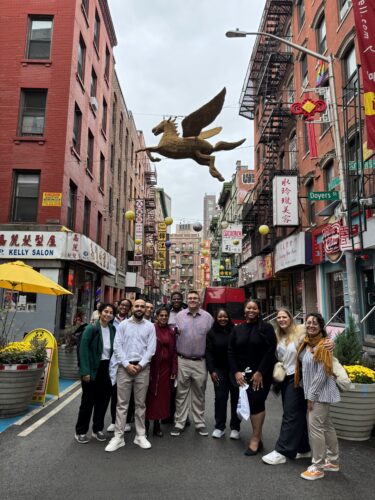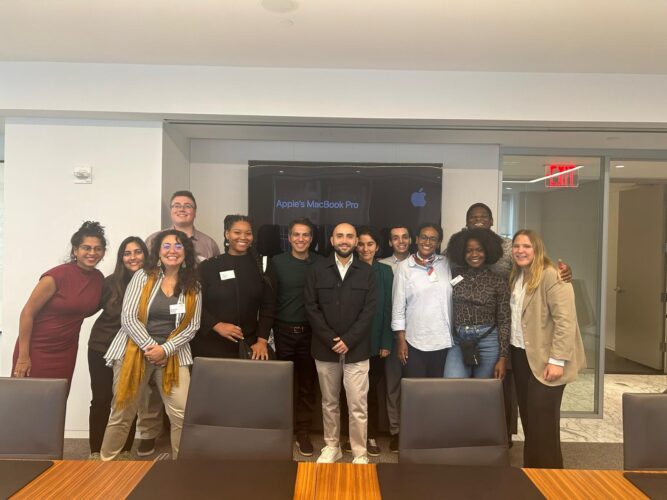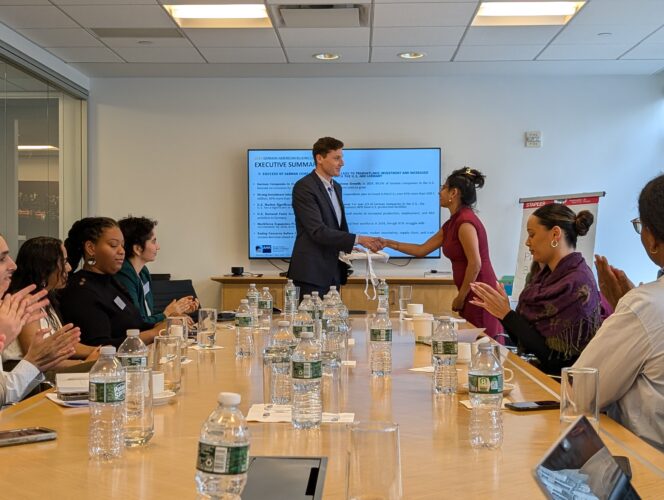A New Bridge Perspective on the Transatlantic Forum on GeoEconomics
Published by Ashley Caradine, Enver Cetin, Ben Hadji, Joshua Higginbotham, Rejoice Jones, Alexandra McGee, and Rim Melake
The 2024 Transatlantic Forum on GeoEconomics, held for the first time in the U.S. and on the sidelines of the UN General Assembly in New York City, gathered political and financial leaders alongside private sector executives. This year’s event, hosted by the Atlantic Council and Atlantik-Brücke, focused on three critical sectors – finance, technology, and energy – facilitating high-level dialogue aimed at fostering multilateral solutions and enhancing transatlantic cooperation. A select group of German and American New Bridge alumni attended, sharing their key observations and highlights.
AI Governance: A Transatlantic Imperative
One theme of the forum was the need for a cohesive approach to AI governance between Germany and the United States. The rapid evolution of AI offers significant opportunities but also raises concerns regarding safety, trust, and ethical use.
“Our view is that safety enables trust, which enables adoption, which enables innovation.” Elizabeth Kelly, Director, U.S. Artificial Intelligence Safety Institute
A standout session featured Elizabeth Kelly from the U.S. AI Safety Institute, who emphasized the foundational role of safety in AI development. In her statements, she highlighted the cascading effect that safety measures have on the entire AI ecosystem. Without robust safety protocols, public trust in AI systems could erode, leading to resistance against adoption and stifling innovation. This is particularly relevant in the transatlantic context, where differing regulatory landscapes could lead to fragmented approaches to AI safety and governance.
The issue of misinformation also emerged as a significant concern. With AI’s potential to both inform and mislead, especially in democratic processes like elections, the need for proactive governance and regulation becomes even more urgent. According to recent statistics, 78% of American adults expect abuses of AI systems that will affect the outcome of the 2024 presidential election. This high percentage reflects widespread public concerns about the potential for AI to undermine democratic processes by spreading misinformation or manipulating voter perceptions. The concern is not unfounded; AI-generated content, such as deepfakes and sophisticated language models, can be highly complex and difficult to distinguish from authentic information, making it a powerful tool for those wishing to influence election outcomes illicitly. This underscores the urgency for regulatory action and responsible governance.
The insights from Elizabeth Kelly and the optimism tempered with caution expressed by Adena Friedman, CEO of Nasdaq, highlight the importance of addressing these challenges proactively. The transatlantic relationship between Germany and the U.S. is pivotal in this endeavor. By aligning regulatory approaches, enhancing safety protocols, clearly defining the responsibilities of technology companies, and taking decisive actions to mitigate risks, both nations can lead the way in shaping an AI environment that upholds democratic values and benefits society as a whole—especially during times when the integrity of elections is at stake.
“My favorite part of the Transatlantic Forum was the in-depth discussions on AI governance and the crucial need for aligning regulatory efforts between Germany and the U.S. to promote ethical AI development. Additionally, engaging with leaders focused on integrating technology into real-world solutions, ensuring that innovations effectively address practical challenges, was truly inspiring.” Enver Cetin, New Bridge Alumnus
Navigating Financial Complexity in a Transatlantic Context
The spotlight conversation with Nasdaq CEO Adena Friedman on “Navigating Financial Complexity: Public-Private Collaboration and Technological Innovation” was particularly engaging and insightful. Ms. Friedman’s insights offered valuable takeaways for transatlantic leaders, highlighting opportunities for collaboration and strategic action to foster innovation, economic growth, and financial stability. Her insights provided a valuable framework for understanding the interconnectedness of geopolitics, financial markets, and technology. For both Europe and the U.S., key takeaways include the potential for strategically investing public retirement funds, facilitating startup investment, leveraging public procurement to support startups, and drawing inspiration from successful models like the Nordic approach to strengthen capital markets. Furthermore, embracing technology is crucial for simplifying complexities, enhancing transparency, and safeguarding the integrity of the financial system.
The session underscored the need for strategic public-private collaboration, with insights into how pension funds could be leveraged for greater returns and economic growth, as seen in the Nordic model. Furthermore, facilitating easier access for financial institutions to invest in startups is crucial for fostering innovation and driving economic growth on both sides of the Atlantic. Reducing bureaucratic hurdles and providing incentives for early-stage investment can create a more fertile ground for startups to thrive, generating new jobs, and contributing to economic competitiveness. More opportunities for both Europe and the U.S. lie in the potential for public procurement to play a more active role in supporting startups. By partially awarding public contracts to startups, governments can provide them with a crucial early revenue stream, facilitating faster access to markets and accelerating their growth trajectory. By leveraging technology, Europe and the U.S. can enhance financial market resilience, security, and trust.
The Global Energy Transition
The panel “Vulnerabilities and Opportunities in the Electric Vehicles Supply Chain”, featuring distinguished guests Sarah Bauerle Danzman, Associate Professor of International Studies, Indiana University; Anahita Thoms, Partner, Baker McKenzie; Chris Smith, Chief Government Affairs Officer, Ford Motor Company, offered valuable insights into the ongoing energy transition debate. The panel highlighted the competitive challenges posed by China’s production overcapacity and also underscored the importance of coordinated energy policy between the U.S. and Europe to address climate challenges and ensure stable supply chains.
Traditional narratives of U.S.-EU diplomacy often emphasize economic partnerships and mutual defense alliances. Climate change will exacerbate existing vulnerabilities and lend to the instability of all these systems. Therefore, a coordinated energy policy will become central to enhance bilateral relations while also addressing global climate challenges. Moving toward this coordinated policy is immensely difficult, especially considering how supply chains for popular technical solutions are wrapped around the globe.
One of the key topics discussed at the Transatlantic Forum on GeoEconomics was the global electric vehicle (EV) market. Ambassador of the United States of America to the People’s Republic of China Nicholas Burns highlighted that China’s EV production currently exceeds domestic demand by 2-3 times, resulting in significant overcapacity. Since 2017, China’s EV exports have grown dramatically, increasing by 13,300% to $42 billion in 2023, with the country now accounting for nearly 70% of global EV production. These vehicles are sold at competitive prices in global markets, prompting several countries to impose tariffs on Chinese EVs to protect their domestic automotive industries.
In response to concerns over potential dumping, China is contesting the European Union’s tariffs at the World Trade Organization and has initiated anti-dumping investigations on Canada’s canola oil. Some observers have drawn parallels between China’s government subsidies and similar measures in the U.S., such as the 2022 Inflation Reduction Act. This situation has highlighted potential policy differences on both sides, fueling rising political tensions with broader geopolitical implications.
“Listening to the ambassador on US-China relations was reassuring about America’s future, but it also shows that China will continue to be the West’s largest strategic competitor.” Ambassador Cameron Munter, CEO & President, EastWest Institute
To conclude the Transatlantic Forum on GeoEconomics on a festive note, Atlantik-Brücke, in collaboration with the Siemens Arts Program, hosted a special concert at New York’s renowned Carnegie Hall to celebrate German-American friendship. The evening featured performances by American and German artists, including the Orchestra of St. Luke’s (OSL) from New York, clarinetist Anthony McGill, cellist Daniel Müller-Schott, and rising cellist Charlotte Melkonian, all under the baton of conductor Prof. Dr. Stephan Frucht. The program included works by Wolfgang Amadeus Mozart, David Popper, and Friedrich Gulda.
After the Forum: A New Bridge Day
On the New Bridge exclusive day of programming, the lunch discussion with the founder and creator of New York’s first German Döner Kebab restaurant, Erkan Emre, provided a compelling narrative of his journey as a German immigrant finding entrepreneurial success in the United States.
The founder’s story fueled a meaningful discussion on the perception of the U.S. as a land of opportunity for immigrants. The conversation drew on personal experiences, data, and comparisons between U.S. and German economic systems, highlighting both opportunities and challenges for immigrants. While the opportunities described by Emre resonated with the group, alumni also expressed concerns about the challenges immigrants encounter, particularly regarding their initial status upon arriving in a new country. The conversation also explored broader issues, including the experiences of first and second-generation immigrants, fostering a rich dialogue on transatlantic economic and social dynamics.
The programming also included a historical walking tour of New York’s Chinatown, an insightful meeting with Lucas Theo Rehaag at the German American Chamber of Commerce in New York, and a discussion on cultural diplomacy with the Executive Director of the Goethe Institute New York, Dr. Jörg Schuhmacher.
All in all, the insights gathered from the discussions, panels, and conversations in New York will serve as a foundation for shaping future policies and strategies that influence international cooperation and development. The New Bridge Program alumni departed with a strengthened commitment to foster a resilient and dynamic transatlantic partnership. Equipped with fresh perspectives and a shared vision, they are poised to advocate for collaboration, innovation, and stability in the face of emerging challenges.
“That’s why international convenings like the Transatlantic Forum on GeoEconomics are so important. These shared spaces allow for us to meet new partners in high places, share innovative novel solutions, strengthen ties that keep the peace within our societies, and advance peaceful statecraft and cultural diplomacy in the years to come.” Alexandra McGee, New Bridge Alumna
This alumni engagement opportunity was funded by the German Federal Foreign Office (AA).

